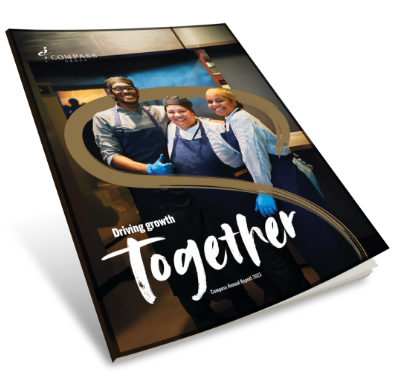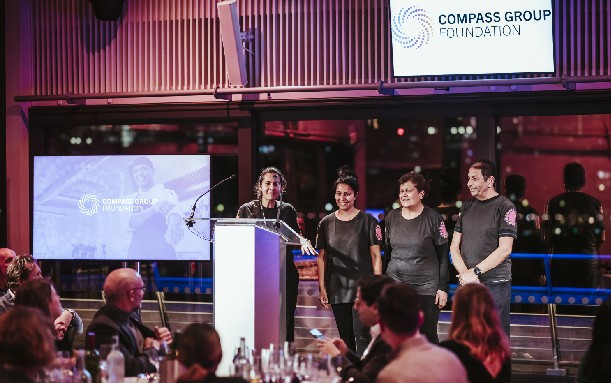Highlights of the year
The Compass Group Foundation
The Compass Group Foundation was launched in January with a mission to improve people’s lives through the advancement of education and training, empowering them to play a key role in the future of food for their communities. By providing grants to non-profit organisations in countries where Compass operates, it aims to create inclusive job opportunities, empower local suppliers, and to provide urgent support in the case of global emergencies.
Strong first half results and share buyback
In May, the Group published strong first-half results, raising its full-year guidance and announcing a further share buyback of up to £750 million. Net new business continued to be excellent, and significantly higher than the historical rate. There was a step change in our performance in Europe, as the region benefited from growth initiatives and favourable outsourcing conditions.
Sustainability Deep Dive
Compass presented a virtual deep dive on its sustainability proposition in September, highlighting the progress we have made with clients, consumers, employees and suppliers in finding collective solutions to meet our commitment to climate net zero by 2050. As well as being better for the planet, our sustainability focus is also contributing tangible commercial benefits, helping the Group to win new business.
Full-Year results for the year ended 30 September 2023
Our performance
-
30%
Underlying operating profit growth1
Statutory operating profit growth 26%
-
19%
Organic revenue growth
Statutory revenue growth 22%
-
6.8%
Underlying operating margin
Statutory operating margin 6.1%
 Alternative Performance Measure (APM) (see pages 206 to 213 of the full Annual Report)
Alternative Performance Measure (APM) (see pages 206 to 213 of the full Annual Report) APM which is also a Key Performance Indicator (see page 7 of the full Annual Report)
APM which is also a Key Performance Indicator (see page 7 of the full Annual Report) UNDERLYING REVENUE
UNDERLYING REVENUE
£31.3bn Underlying revenue
-
Food services85%
-
Support services15%
 UNDERLYING REVENUE
UNDERLYING REVENUE
BY REGION
3 Regions
-
North America67%
-
Europe23%
-
Rest of world10%
 UNDERLYING REVENUE
UNDERLYING REVENUE
BY SECTOR
5 Sectors
-
Business & Industry35%
-
Education18%
-
Healthcare & Senior Living24%
-
Sports & Leisure15%
-
Defence, Offshore & Remote8%

Our strategic framework
-
Performance
Deliver long-term valued relationships
We use the Management and Performance (MAP) framework to drive performance across the Group. This discipline ensures businesses are managed efficiently while continuing to delight clients and consumers with innovative, healthy and exciting food service solutions.
Step change in Europe performance
With the majority of the food services market still self-operated or in the hands of regional players, the outsourcing opportunity in Europe remains significant. We are capitalising on this potential, with net new business growth in Europe now much higher than our historical rate. This reflects both higher new business wins and an improving retention rate. A stronger growth mentality is being embedded in our European business which is benefiting from investments made in its people, brands, and processes. We are being more proactive in our approach to winning new business and retaining clients, which has resulted in a larger sales pipeline, increased conversion rates and better retention rates. -
People
Create lifetime opportunities
People are at the heart of who we are and what we do. Compass is uniquely positioned to create lifetime opportunities and to positively impact and represent the communities in which its businesses operate.
-
Case study
-
Over £590m
Social and Local Economic Value (SLEV) created
-
-7.9%
ethnic minority median pay gap
Social Promise, Compass Group UK & Ireland
Compass Group UK&I’s Social Promise sets out its aspiration to positively impact one million lives by 2030 through job creation, education, training and community and charitable engagement. Underpinning its Social Promise is a commitment to addressing barriers to progression, particularly in relation to gender, race and among those from less-advantaged or under-represented backgrounds. -
-
Purpose
Maintain a positive social and environmental impact
Compass continually seeks ways to be more socially and environmentally responsible. Our purpose continues to drive innovation and collaboration across the Group as partnerships with clients, business partners and local communities are strengthened.
Progress on our journey to address Scope 3 emissions
We have taken the next step on our journey to reach climate net zero by 2050 by partnering with leading climate management platform Planet FWD. It was a big step, enabling us to improve our methodology for measuring emissions and enhancing the quality of our data for the supply chain (Scope 3) which generates most of our greenhouse gas (GHG) emissions. Our total Scope 3 emissions for 2022 were calculated using data from our top four markets – the US, UK, France and Australia representing 78% of our global revenues – using a hybrid volume and spend approach, and extrapolated to our smaller markets. We particularly focused on increasing data quality for purchased goods, the most significant source of emissions.
Market review
Supporting sustainable growth
The addressable global food services market is worth at least $300 billion, of which Compass has less than 15% market share. This provides us a significant runway for growth, as nearly three-quarters of the market is still self-operated or in the hands of regional players.
In addition, there are further growth opportunities for Compass in vending, selected areas of food delivery, and targeted support services.
The drivers for outsourcing are also growing, due to increased regulation, operational complexity and inflationary pressures.

c.$300bn
addressable global food
services market
key performance indicators
We track our progress against a mix of financial and non-financial measures, which we believe best reflect the delivery of our strategy. We measure growth, efficiency and shareholder returns, which are all underpinned by our focus on safety and our impact on the environment.
Organic revenue change1
18.8%
Organic revenue growth was strong at 18.8% reflecting balanced net new business growth across our regions, higher pricing and base volume recovery during the first half of the year.
Underlying operating margin1
6.8%
Underlying operation margin improved by 60bps to 6.8% as the Group benefited from operational leverage.
Underlying free cash flow1
£1,241m
Underlying free cash flow increased to £1,241 million in 2023 representing a conversion rate of 58.5% of underlying operating profit.
Underlying basic earnings per share1
86.1p
Earnings per share growth of 36.7% in 2023 reflected the Group’s strong revenue growth and the improvement in underlying operating margin.
Return on capital employed (ROCE)1
19.5%
ROCE of 19.5% improved in the most part due to the increase in underlying operating profit during 2023.
Global Lost Time Incident Frequency Rate2
1.98
Lost Time Incident Rate further improved to 1.98 reflecting continued focus on loss prevention and return to work initiatives across our regions.
Global Food Safety Incident Rate2
0.15
Our focus on Global Food Safety has led to a reduced rate of incidents on a 5-year basis (down 25%), despite our business having grown significantly since 2019.3
Greenhouse gas intensity ratio (GHG)2
6.4 tCO2e/£m
When normalised by revenue we have seen a 12% year-on-year reduction in our GHG emissions ratio.4
SAFETY AND ETHICS
Compass prioritises safety as its top operational concern; people are at the heart of our business and so taking care of them is of the utmost importance to us. Our commitment to uphold the highest standard of ethics and integrity has earned us our position as a global leader, trusted partner, and a role model for ethical behaviour.
Evolving our systems
As our business continues to grow, so does our investment in safety management systems. Compass’ safety platforms are structured to manage risk and enhance operational performance.
Personal safety
Our safety culture emphasises the fundamental importance of incident prevention and intervention. Through awareness, information and training, we empower our people to take individual and collective responsibility for their own safety and the safety of those around them.
Food safety
Compass’ core values and safety protocols guide the decisions, actions and behaviours of our people and serve as a foundation for the way our businesses operate. Suppliers undergo a rigorous approval process, with any areas for improvement remedied to mitigate wider risks.
Safety governance
We continue to diligently focus on a culture of care, respect and safety; empowering our people to adopt behaviours that keep them free from harm while delivering for clients and consumers. Safety learnings are shared right across the business with a safety moment at the start of management meetings, whilst Board and Executive Committee meetings regularly feature health and safety updates.
Safety targets
The practice of transparently reporting safety performance encourages a culture of accountability and contributes to continuous improvement in safety practices. Countries are required to report monthly on their LTIFR and FSIR.
Priorities for the year ahead
The business will prioritise initiatives that further a holistic safety culture; one of those initiatives is the move to measuring personal injury rates focusing on Total Recordable Injury Frequency Rate (TRIFR) rather than LTIFR for 2024 onwards.
Doing what is right
Compass has a passionate commitment to uphold the highest standards of ethics and integrity (E&I) which has earned us our position as a global leader and trusted partner. We believe in responsible leadership; we aim to set the standard and act as a role model for ethical behaviour.
Our E&I programme
Our risk-based programme and policy framework provide the minimum standards, expectations and guidance for Compass’ employees and those who act on our behalf, to ensure business is conducted in an ethical, fair and responsible way.
Global initiatives
Committed to continued improvement, this year we have prioritised:
- refreshing and relaunching our CBC
- launching our Business Integrity Policy
- introducing an annual E&I awareness week
- strengthening integrity due diligence
- improving governance and management reporting
- supporting further embedding of Compass’ Human Rights Policy
Training and awareness
Through communication, awareness and training, we empower, encourage and equip our people to spot red flags and make wellinformed integrity-driven decisions.
Pledge and declaration
To confirm understanding of and compliance with the CBC, our annual self-certification process requires all our target training population of around 18,000 employees globally (2022: around 13,000) to provide a pledge and declaration covering key business integrity risk areas and conflict of interest disclosures.
Priorities for the year ahead
In partnership with the businesses and our community of E&I leaders, we will prioritise our initiatives in accordance with our strategic plan as approved by the Corporate Responsibility Committee. These priorities include continuing to embed third-party integrity due diligence as part of local country processes, improving management of high-risk third parties, enhancing monitoring and oversight procedures, and optimising our E&I suite of tools and technologies.










